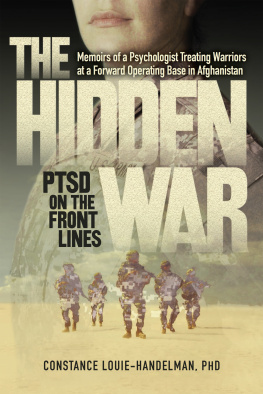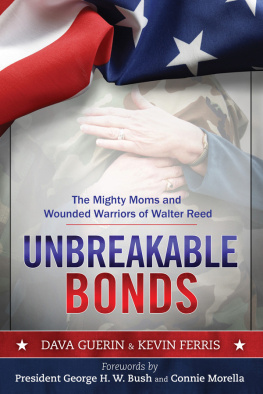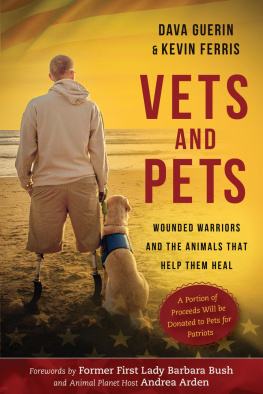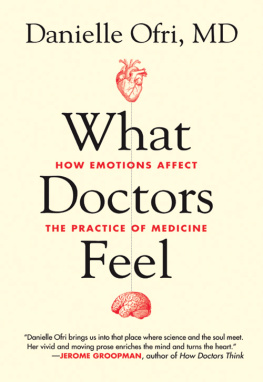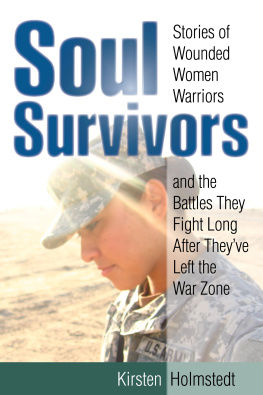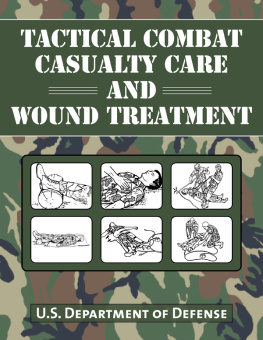While working on several projects about Americas war on terrorism and our wars in Iraq and Afghanistan, I decided I wanted to pay tribute to the medical personnel who care for our nations wounded warriors. From the Navy corpsmen and combat medics accompanying our front-line troops and convoys, to everyone at aid stations and the field hospitals, on the dust-off flights and the Nightingale transports from the war zones, and the stateside military hospitals, burn wards, rehab centers, and VA hospitals, I sought to tell their story. Actually I wanted them to tell their own story... if I could just get them to sit still long enough to do it!
I quickly learned that many of these Type A personalities dont know how to slow down long enough to write about patients they cant forget. Even those who were willing to write something werent sure if they could select just one patient from the hundreds, possibly thousands, they have cared for over many years.
For some who wrote stories for The One , they welcomed the task of recalling their patient and the events that unfolded while caring for them.
Robert G. Holcomb, who wrote Mission to Kosovo and Back, wrote: At the completion of the transport flight, we all felt like any marathon runner who experiences the post-race high, a compilation of jubilation, relief, and a sense of tremendous pride. For me, reliving that flight today brings back that feeling, like a glorious reward for a job well done. In reality, it defines a passion all who do medical transport flights have, and validates we are truly following Gods chosen path for us.
Col. Stanley Chartoff, who wrote Richardand generously provided me with invaluable guidance in completing The One explained the special bond those who work in military trauma medicine share and have a hard time leaving: My testimonial to the importance of military medicine relates to a talk I heard at a military medical conference. I listened to a young female captain physician who concluded her talk with the story of an Air Force former pararescuer (PJ) missing a leg, who walked into her office, asking her to medically clear him to return to duty in pararescueone of the Air Forces most difficult occupations recovering downed aircrew in hostile areas and providing emergency medical treatment.
She could have told him it was hopeless, but instead she wrote his waiver and pushed it through. That airman was returned to the PJs and is now saving the lives of others. Knowing that young professionals like this Air Force captain are there to continue the tradition of military medicine makes me proud.
I reached out to hundreds in military trauma medicine, in collecting stories for The One . They all expressed interest in the project, though many said they either didnt feel comfortable with their writing skills, or couldnt find the time. Heres an example of just one message I received from a trauma surgeon who has served in both Iraq and Afghanistan: I have a hundred stories, but I will send you the one that not only sticks in my mind and heart, but the one I can barely speak of without crying. I pray I am able to honor my hero appropriately with mere words. (Unfortunately, despite several promises to send in her story, this surgeon still didnt feel comfortable writing about the soldier who ended up being flown to Landstuhl Hospital in Germany, then stateside for follow-up surgeries and rehabilitation.)
Several doctors and nurses wanted to write about their tours in Iraq and Afghanistan, but that would divert from the theme of the book, which is remembering The One patient they cant forget: I must confess it has taken a whole bunch of patient experiences to add up... not just one earth-shattering experience. As a group, the wounded warriors I took care of in Afghanistan remain the greatest inspiration.
With so many critically injured patients, an endless unbroken chain of carnage, was it easier to deal with if these care providers shut off their emotions?
Connie Bengston (Learning to Run and The Silly String Ambush) wrote: I entered each new assignment knowing it would cost, and it would take a toll, but still I did so every time with eagerness, wanting to be of service to those willing to sacrifice everything for our country. These are things we do not talk about as nurses. Our duty is to be care providers, and we are responsible to plan that care, to ensure each patient receives proper care, but it is never appropriate for us to truly care. We all know that doing so is going to hurt emotionally. I knew that caring too much was going to break my heart, it was going to leave scars that may never be seen by others, but that was a price I was willing to pay for those who freely went in harms way for me and for our country. I plan to continue to write and maybe at some point have something worthy to offer in the form of my own book. It might be painful sometimes, but whatever the outcome, it will be a journey that is necessary to complete.
One longtime trauma surgeon dispelled the impression that military doctors and nurses are just performing meatball surgery, and dont have any compassion for their patients, that they simply dont have time to care. To me all of these brave troops have stood out in my mind as being something very special, especially those we could not successfully treat. Its very sad to see the youngest ones, who had a hopefully long life ahead, who had not really experienced living and never got the chance.
Every night you just weep bitter tears, and pray for those they leave behind... parents, siblings, wives, girlfriends, children who will never know their dad or mom. (It was too emotionally draining for him to write a story for this book and I certainly understand.)
Every combatant who makes it to the aid station or field hospital is someones son or daughter. They may be married, and they might have kids. Tragically many of them are mortally wounded, and so then it becomes a priority to keep them on life support and get them home as quickly as possible, so their families can see them one last time:
Writing about my one patient stirred up a lot of memories, wrote Trish Hayden , author of A Knife in the Head and The Best Job in the World. I thought about the heroes we brought home to receive a higher echelon of care, and also of the ones we kept alive just long enough for the flight, so the families could say goodbye. After every deployment I come home thinking dont sweat the little things because transporting wounded warriors is a reality check. After a while, things get back to normal and I start to let the little things bother me again. Writing this was a nice reality check... it reminded me that life is too short and we never know when it will be over. And a nurse who served in Iraq, wrote: While deployed, I saw too many soldiers come through our ER. One evening I helped inventory the personal effects of a soldier. He had just returned to the war zone after a short trip home for some well-deserved leave. This particular situation triggered something and I went back to my room after my shift and wrote a letter to him apologizing for not being able to save him. I never wrote down his name due to patient confidentiality, but I think my apology was really for all the soldiers I could not save.
I found it interesting that this nurse took it personally that she couldnt save this and many other soldiers, even though an entire team of medical personnel are involved with the treatment of every patient. Still, she carries a heavy heart because she couldnt do more. As such, when one becomes one too many, compassion fatigue or burnout can take its toll.
Debra Berthold (A Quiet Conversation) had a similar experience, and wrote about the young soldier who was killed in the Berlin disco bombing many years ago. Her job was to prep his body for transport to the States and list his possessions: I dont think I truly understood what it meant to be a soldier until I had to deal with such a useless act of terrorism which took the life of a vibrant young man... who was the age my youngest son is now.


